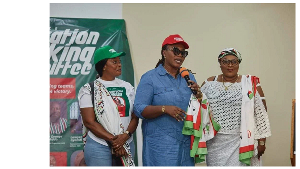 Eastern Regional Women’s Organizer of the NDC, Shirley Naana Osei Ampem (M)
Eastern Regional Women’s Organizer of the NDC, Shirley Naana Osei Ampem (M)
The Eastern Regional Women’s Organizer of the National Democratic Congress (NDC), Shirley Naana Osei Ampem, has praised the party’s flagbearer, John Mahama, for his promise to establish a Fertility Center if elected in the 2024 Presidential election.
Mahama announced on Saturday, August 24, 2024, at the launch of the party’s manifesto that, the next NDC government will construct state of the arts Fertility Center in Accra to address infertility challenges.
According to Shirley Naana Osei Ampem, infertility affects both men and women but disproportionately stigmatizes women, often leading to significant marital and social issues.
She noted that infertility can cause severe emotional distress, stigma, and financial hardship, impacting the mental and psychosocial well-being of those affected.
She, therefore, believes the construction of such first state-funded specialist health facility “will bring peace to homes”.
“This intervention is very timely and laudable. It offers a sigh of relief for many couples struggling with infertility and the societal stigma associated with it. Many women are going through a lot due to this problem even though and do not have peace of mind. In fact, the manifesto was a gender-focused look at the proposed Women’s Bank and quota for women in governance. All these are evidence of John Mahama and his running mate, Prof. Jane Naana Opoku-Agyemang’s commitment to addressing gender-based issues”, Shirley Naana Ampem stated during an interview with Starr FM.
According to the World Health Organization (WHO), infertility affects one in six people globally, with 17.5% of the adult population likely to experience it at some point in their lives.
WHO report says despite the scale of the issue, solutions for the prevention, diagnosis and treatment of infertility – including assisted reproductive technology such as IVF – remain underfunded and inaccessible to many due to high costs, social stigma and limited availability.
The WHO has called for improved policies and public financing to make fertility treatments more accessible, especially in low and middle-income countries.
“Government policies could mitigate the many inequities in access to safe and effective fertility care. To effectively address infertility, health policies need to recognize that infertility is a disease that can often be prevented, thereby mitigating the need for costly and poorly accessible treatments.
...Incorporating fertility awareness in national comprehensive sexuality education programmes, promoting healthy lifestyles to reduce behavioural risks, including prevention, diagnosis and early treatment of STIs, preventing complications of unsafe abortion, postpartum sepsis and abdominal/pelvic surgery, and addressing environmental toxins associated with infertility, are policy and programmatic interventions that all governments can implement” WHO report stated.
In addition, enabling laws and policies that regulate third-party reproduction and ART are essential to ensure universal access without discrimination and to protect and promote the human rights of all parties involved.
“Once fertility policies are in place, it is essential to ensure that their implementation is monitored, and the quality of services is continually improved”.